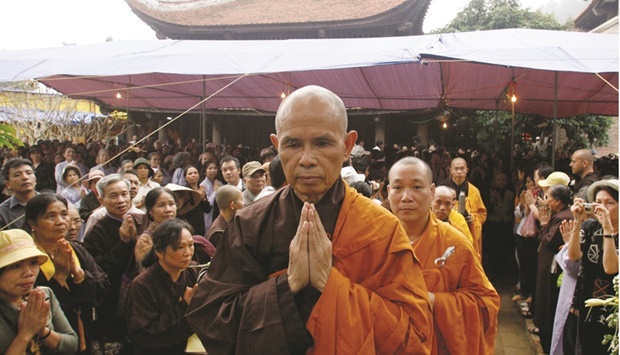Thousands of mourners packed a pagoda in Vietnam’s Buddhist heartland yesterday to pay tribute to the late Vietnamese monk and peace activist Thich Nhat Hanh, credited with bringing mindfulness to the West.
The Zen master, whose reach within Buddhism was seen as second only to the Dalai Lama, died aged 95 on Saturday at the Tu Hieu Pagoda in the city of Hue.
Widely known as the father of mindfulness, Thich Nhat Hanh spent nearly four decades in exile after he was banished from his homeland for calling for an end to the Vietnam War.
He wrote more than 100 books on mindfulness and meditation and hosted retreats worldwide.
Early morning yesterday chanting monks carried his body covered by a yellow sheet along with decorative umbrellas through the throng of mourners.
The smell of incense wafted in the air as they put his body in a wooden coffin and placed it in the meditation hall decorated with yellow daisies.
Buddhist monks in yellow and brown robes recited prayers and followers wearing grey stood in silent contemplation of a remarkable life.
Among the mourners was Tran Dinh Huong, 46, who hastily travelled from Hanoi to pay her respects.
“I read many of his books and his words helped me a lot when I was down or going through difficulties,” she told AFP. “I think it will be a very long time until Vietnam and the world has such a great teacher again.”
Nguyen Nhat from Ho Chi Minh City said it was deeply moving to see the body.
“I admire him for his simple and modest life,” he told AFP.
Thich Nhat Hanh spent 39 years in France and advocated for religious freedom around the world.
Vietnamese authorities permitted him to return to the country in 2018 but plainclothes police kept a vigil outside the pagoda compound closely monitoring his activities.
His messages have not always been welcomed as authorities in one-party Vietnam are wary of organised religion: in 2009 his followers were driven from their temple in southern Lam Dong province by hired mobs.
However, Cong An Nhan Dan newspaper – considered the official mouthpiece of the public security ministry – published yesterday a glowing tribute to the writer, poet, scholar, historian and peace activist.
“Monk Thich Nhat Hanh from the Plum Village was a spiritual teacher who had a deep and widespread influence across the world,” the obituary said.
Thich Nhat Hanh’s coffin is expected to remain in the meditation hall for a week – as mourners file past to pray – before a cremation ceremony next Saturday.
Memorial ceremonies will also take place at monasteries in the United States and France and will be broadcast online.
Tributes flowed to the late monk from all over the world.
The Dalai Lama said his friend and spiritual brother had lived a “truly meaningful life”.
“I have no doubt the best way we can pay tribute to him is to continue his work to promote peace in the world,” he wrote in a message to the monk’s Zen teaching organisation – the Plum Village Community of Engaged Buddhism.
South Korean President Moon Jae-in said the monk visited his country three times and praised him as a “living Buddha”.
“(He) showed his love for mankind through his actions,” he said on Twitter.
Marie C Damour, charge d’affaires at the US embassy in Hanoi, said he would be “remembered as arguably one of the most influential and prominent religious leaders in the world”.
“His teachings, in particular on bringing mindfulness into daily life, have enriched the lives of innumerable Americans,” she added.
US comedian and director Judd Apatow urged people to read the monk’s work, characterising it as “life changing” in a Twitter post.
Supporters said Thich Nhat Hanh’s legacy will continue.
“I see the master in every single grass, flower, tree branch. He did not pass away, he remains there in another form and status,” Le Khanh Linh told AFP at the pagoda.

This picture taken in 2007 shows Buddhist monk Thich Nhat Hanh at the opening ceremony of a requiem mass at the Non Nuoc pagoda in Soc Son mountain, 64km north of Hanoi.
